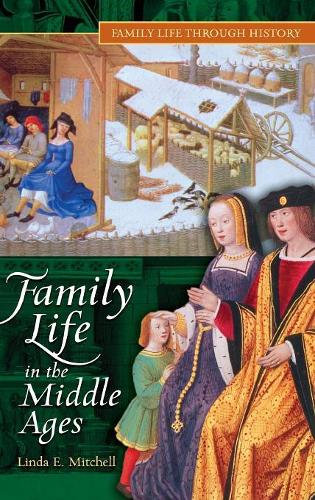
Family Life in The Middle Ages
(Hardback)
Publishing Details
Family Life in The Middle Ages
By (Author) Linda E. Mitchell
Bloomsbury Publishing PLC
Greenwood Press
30th August 2007
United States
Classifications
General
Non Fiction
European history: medieval period, middle ages
306.850902
Physical Properties
Hardback
256
Width 156mm, Height 235mm
539g
Description
Mitchell takes a regional approach in exploring the lives of families in the Middle Ages. Starting with the late Roman families the first five chapters explore the roles of family members defined by tradition and law, what constituted a legal marriage and a family, to whom the children belonged, and who was included in the extended family. The remaining chapters delve into daily family life - homes of various social classes and the division of labor, both maintaining the home and family-based labor such as agriculture, banking, manufacturing of goods, and mercantile activity. Religious cultures of the medieval world varied but all often included oblation of children to monasteries, religious ceremonies for life stages, and family obligations in the religious culture. Birth, death and inheritance all affected the family and new families were often formed from previous generations and defunct family lines. Non-traditional families included family structures advocated by heretical groups - the Cathars and the Beguines, families created without marriage - concubinage relationships, and those that developed as a result of social and environmental stresses - the Black Death, war, and natural disasters. Perfect for students studying the Middle Ages and medieval life, this work provides a clear and engaging narrative on the day-to-day lives of the family. Reference resources include a timeline, sources for further reading, photographs and an index. Volumes in the Family Life Through History series focus on the day-to-day lives and roles of families. The roles of all family members are defined and information on daily family life, the role of the family in society, and the ever-changing definition of the term family' are discussed. Discussion of the nuclear family, single parent homes, foster and adoptive families, stepfamilies, and gay and lesbian families are included where appropriate. Topics such as meal planning, homes, entertainment and celebrations, are discussed along with larger social issues that originate in the home like domestic violence, child abuse and neglect, and divorce. Ideal for students and general readers alike, books in this series bring the history of everyday people to life.
Reviews
Plenty of useful and thought-provoking material. The inclusion of several cultures from the era, with frequent discussions of similarities and differences, makes this work particularly useful. * School Library Journal *
Author Bio
Linda E. Mitchell is Associate Professor of History at Alfred University. She is Hagar Professor of Humanities and Co-chair, Medieval & Renaissance Studies. She contributed to Events that Changed the World in the Eighteenth Century (Greenwood, 1997).
